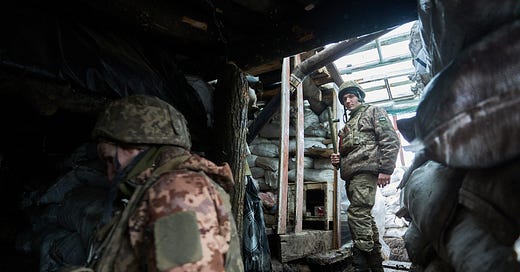Not so quiet on the Eastern front
Reporting from Ukraine, three published stories and a new-newsletter.
Apologies for the radio silence, y’all.
Both a play on words (you’ll see below) and an admission of my own failings with the previous iteration of this newsletter, formally called War, U.S.A.
I’ve archived those posts here, in Forged, a less-frequent (and less-formal) version. This one’s occasional (donations are welcome, not required, and all content is made public). And it’s focused on conflict from an even further-removed vantage, not only on veterans or wars specifically. As any writer or reader will know, conflict is everything: the meat in your lunch panini, the flavoring of life that spurs you to action each morning, and without it we are but corporeal dust entrusted to wind.
So the name: it is a play on the name of a school I attended (the same school J.D. Salinger went to, but that’s from a different essay and I won’t belabor you with that story again here).
What I really want to tell you about is the month I’ve had so far.
On Sunday I returned from a 10-day reporting trip to the Donbas region in Eastern Ukraine, where pro-Russian separatists control two areas not officially recognized by either the central government in Kyiv or the international community. My takeaway: the conflict isn’t seeing a revival and it hasn’t been “frozen.”
Rather, it has gone cyber.


For Politico Magazine I wrote about what I called Russia’s “proving ground for a new type of digital warfare.” The Russians and their proxies have used digital technology on the battlefield not only to assist artillery in rapidly acquiring and engaging targets, but also to disrupt communications and wage psychological warfare, like sending threatening text messages to soldiers. Beyond the front lines, Russian efforts have knocked out government websites and spread damaging disinformation in towns and cities across the country. Digital warfare has threatened more of Ukrainian society since 2021 than traditional munitions.
Hours after the story published, a distributed denial of service (DDoS) attack hit Kyiv, crippling the Ministry of Defense, the Ukrainian Armed Forces and two banks. I hope you’ll read it. It’s got a great headline.
I appeared on both Politico’s Dispatch podcast, which has a totally unregrettable opening scene of me fumbling with my pen in the frigid weather, and a segment of NewsNation Now, in which I still look like I’m in a frontline trench thanks to my home bunker-office-Unabomber woodshed.
I also filed a story for The Daily Beast about insiders’ fear that military hardware could trickle into Donbas from joint Russian-Belarusian military exercises, a story which predicts an (limited) invasion after Feb. 20.
And for The New Republic I also wrote about the internally-displaced persons who feel lost both under occupation and in their efforts to integrate into greater Ukraine.
That’s all for now. I’m working on a few long-term projects, and also a smattering of things that are not related to conflict. At any rate, I wanted to leave you with a personal admission: over the last four years I fell out of love with writing. That’s changed now — I don’t know how, but I rekindled that lost joy.
I don’t want that to happen again. Keep me in check. More soon …




